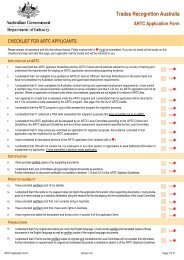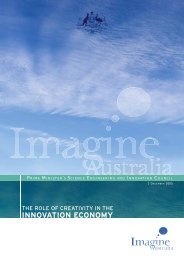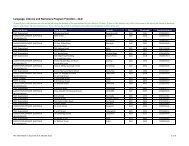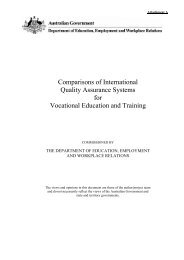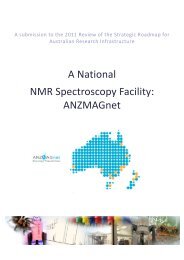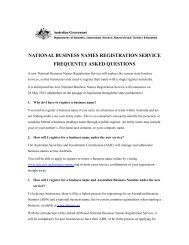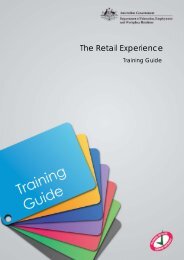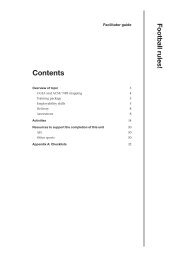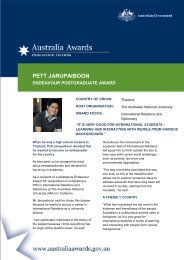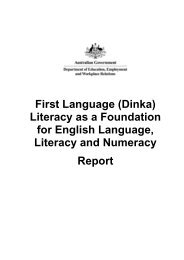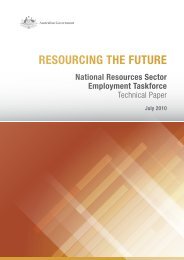aucea - Department of Innovation, Industry, Science and Research
aucea - Department of Innovation, Industry, Science and Research
aucea - Department of Innovation, Industry, Science and Research
You also want an ePaper? Increase the reach of your titles
YUMPU automatically turns print PDFs into web optimized ePapers that Google loves.
combination <strong>of</strong> both. Often the focus is on the process <strong>of</strong> engagement rather than<br />
the outcomes <strong>of</strong> engagement because <strong>of</strong> the necessarily longitudinal nature <strong>of</strong><br />
many <strong>of</strong> these outcomes. If, for example, it is hypothesised that university<br />
community engagement will produce more engaged citizens, when <strong>and</strong> how will<br />
universities <strong>and</strong> communities measure this outcome? In an age <strong>of</strong> accountability<br />
<strong>and</strong> short political timelines it is easy to be seduced by the easily measured. But<br />
are these measures an indication <strong>of</strong> what really matters <strong>and</strong> is the process<br />
enabling universities to improve <strong>and</strong> progress?<br />
Community Engagement Benchmarking Framework<br />
The AUCEA Benchmarking Pilot Project (2006‐2008) developed <strong>and</strong> tested a<br />
community engagement framework <strong>and</strong> indicators.<br />
The framework had a dual purpose. It firstly aimed to provide universities with<br />
a basic capacity to make ongoing comparisons with other universities<br />
throughout Australia <strong>and</strong>, through this, the adoption <strong>of</strong> ‘good practice’ where<br />
relevant to their circumstances, while at the same time retaining institutional<br />
confidentiality <strong>and</strong> individuality. Secondly, the framework aimed to provide the<br />
core elements for each university to tailor a more comprehensive local<br />
benchmarking process that will best fit their particular mission <strong>and</strong> community<br />
context. In both situations it is expected that the quantitative <strong>and</strong> qualitative<br />
assessments undertaken by the university will be by way <strong>of</strong> mutual partnership<br />
with their communities.<br />
The benchmarking framework comprises goals, strategies <strong>and</strong> measures that are<br />
commonly associated with high quality <strong>and</strong> effective engagement. In this regard<br />
it is concerned with the quality <strong>of</strong> partnership relationships between university<br />
<strong>and</strong> community; the responsiveness <strong>of</strong> university governance management <strong>and</strong><br />
administrative processes; questions <strong>of</strong> university accessibility; <strong>and</strong> the way that<br />
research, teaching <strong>and</strong> learning supports staff student <strong>and</strong> community<br />
involvement.<br />
As an outcome <strong>of</strong> the benchmarking, pilot measures have been recommended<br />
which include partner satisfaction (including partner perception <strong>of</strong> student<br />
learning, access to the university regional community <strong>and</strong> partnership benefits)<br />
<strong>and</strong> quantitative measures <strong>of</strong> community engaged research <strong>and</strong> <strong>of</strong> engaged<br />
experiential learning. An additional five institutional self‐assessment measures<br />
are proposed: community engagement as a criterion in staff review tenure <strong>and</strong><br />
progression; student awareness, involvement <strong>and</strong> rewards; community<br />
engagement budget/investment; staff reward <strong>and</strong> recognition; <strong>and</strong> community<br />
partner incentives.<br />
Draft Response Indicator Framework for Higher Education Performance Funding 4



